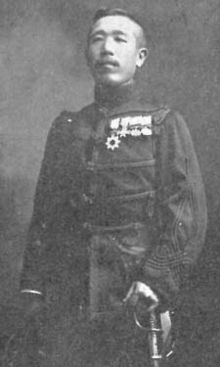"Yuki no Shingun" (Japanese: 雪の進軍, lit. 'The Snow March') is a Japanese gunka composed in 1895 by Imperial Japanese Army musician Nagai Kenshi [ja] who reflected his experience in the Battle of Weihaiwei during the First Sino-Japanese War. The song was banned in the Imperial Japanese Army during World War II and was used in the 1977 film Mount Hakkoda.
Background

During the Battle of Weihaiwei, the Imperial Japanese Army experienced heavy snow and low temperature, while being under-equipped with water, food and fuel. Nagai reflected in his song the hardship Japanese soldiers experienced and their discontentment about the war. The song, which was popular at the time of its publication and is described by scholars to have an upbeat melody, was said to be favoured by Ōyama Iwao. It was also taught and sung in Japanese schools during the late Meiji period.
Nagai's song was later widely referred to by soldiers during the Second Sino-Japanese War and the Pacific War. The discontentment about the war expressed in the song were viewed as antagonistic to Japanese militarism and prohibited by the Imperial Japanese Army, though the effectiveness of the order was in doubt.
Lyrics


Problems playing this file? See media help.
| Kyūjitai | Shinjitai | Rōmaji | English Translation |
|---|---|---|---|
| 雪の進軍 氷を踏んで
何處が河やら 道さへ知れず 馬は斃れる 捨てゝもおけず 此處は何處ぞ 皆敵の國 儘まよ大膽 一服やれば 頼み少なや 煙草が二本 |
雪の進軍氷を踏んで どれが河やら道さえしれず |
Yuki no shingun koori wo funde |
Marching in the snow, stepping on ice |
| 燒かぬ乾魚に 半煮え飯に
憖生命の ある其の内は 堪へ切れ無い 寒さの焚火 煙い筈だよ 生木が燻る 澁い顏して 功名噺 「粋」いと云ふのは 梅干し一つ |
焼かぬ乾魚に半煮え飯に なまじ生命のあるそのうちは |
Yakanu himono ni han-nie meshi ni |
Dried fishes are not dry enough, and the rice won't be cooked enough. |
| 着の身着のまゝ 氣樂な臥所
背嚢枕に 外套被りや 背の溫みで雪融け掛る 夜具の黍殻 シッポリ濡れて 結び兼ねたる 露營の夢を 月は泠たく顏覗き込む |
着の身着のまま気楽な臥所 背嚢枕に外套被りゃ |
Ki nomi ki no mama kiraku na fushido |
The clothes we wear are our carefree beds |
| 命捧げて 出てきた身故
死ぬる覺悟で 吶喊すれど 武運拙く 討死にせねば 義理に絡めた 恤兵眞緜 そろりそろりと 頚締め掛る どうせ生かして 還さぬ積り |
命捧げて出てきた身ゆえ 死ぬる覚悟で吶喊すれど |
Inochi sasagete detekita mi yue |
As we came here in debt of our lives |
In popular culture
- The 1977 film Mount Hakkoda used "Yuki no Shingun" and associated this song with the Hakkōda Mountains incident.
- The Japanese version of the 2005 video game Destroy All Humans!, released in 2007, referred to the first two lines of the song.
- The 2012 anime Girls und Panzer shows Yukari Akiyama and Riko "Erwin" Matsumoto singing the song during a reconnaissance march through the snow in episode 9, and the anime's sequel films Girls und Panzer der Film and Girls und Panzer das Finale use the melody as a leitmotif for the Imperial Japanese Army-themed Chi-Ha-Tan Academy.
References
- Japanese culture in the Meiji era. Vol. 3. Toyo Bunka. 1969. p. 483.
- "【北京春秋】日清戦争激戦の地・威海は韓国にも近い タコの躍り食いに思う遠い日々" [Pekin shunjū] nisshinsensō gekisen no ji - Ikai wa Kankoku ni mo chikai, tako no odorigui ni omou tōi hibi [ The land of the Sino-Japanese War battle, Weihai is close to South Korea. On distant days I think of eating octopuses]. Sankei Shimbun (in Japanese). 2018-07-13. Retrieved 2019-05-11.
- Kamikawa, Taketoshi (2004-07-23). 児玉源太郎: 日露戦争における陸軍の頭脳 Kodama Gentarō: Nichirosensō ni okeru rikugun no zunō [Kodama Gentarō: Army Brain in the Russo-Japanese War] (in Japanese). PHP研究所.
- "永井健子氏が作詞作曲を手掛けた「雪の進軍」について" Nagai Kenshi-shi ga sakushi sakkyoku o tegaketa 'Yuki no shingun' ni tsuite [On "Yuki no Shingun" written by Nagai Kenshi]. Survival Game & Military Map (in Japanese). 2017-11-10. Retrieved 2019-05-11.
- The Japan Year Book. Japan Year Book Office. 1941. p. 1941.
- Rimer, J. Thomas (2014-07-14). Culture and Identity: Japanese Intellectuals during the Interwar Years. Princeton University Press. p. 280. ISBN 978-1-4008-6125-5.
- Washington, Garrett L. (2018-09-13). Christianity and the Modern Woman in East Asia. BRILL. p. 102. ISBN 978-90-04-36910-8.
- Lone, Stewart (1994-08-30). Japan's First Modern War: Army and Society in the Conflict with China, 1894-5. Springer. p. 95. ISBN 978-0-230-38975-5.
- May, Elizabeth (1963). The influence of the Meiji period of Japanese children's music. University of California Press. p. 42. ISBN 978-0-598-14700-4.
- ^ "雪の進軍" Yuki no shingun [Yuki no Shingun]. world-anthem.com (in Japanese). Retrieved 2019-05-11.
- るるぶ ガールズ&パンツァー Rurubu Gāruzu ando Pantsā [Rurubu Girls und Panzer] (in Japanese). Jtbパブリッシング. 2015-07-24. p. 35. ISBN 978-4-533-10609-5.